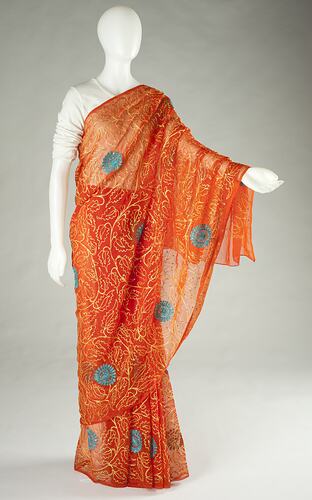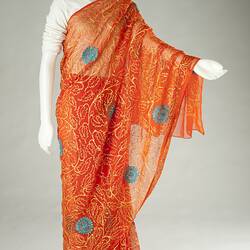Summary
Alternative Name(s): Wedding Dress
Orange sari, embroidered with floral pattern enhanced with sequins and metallic thread.
Worn by Hazra Bibi at her wedding in Suva, Fiji, in 1977, at the age of 17. It was an arranged marriage: her father was a successful businessman who wanted his oldest daughter to marry as soon as she had left school. Her future husband Mohommad, who she had not met, was living in Australia, and came to Fiji for the wedding. Like her, he was a Muslim. Hazra chose her own wedding sari. It cost $250 - a very large sum in those days.
According to tradition, the couple signed papers at the registry office in advance of their wedding. The following week, a large wedding was held at Hazra's home, provided by her father. Just four weeks after the wedding process started, Hazra and Mohommad left Fiji to settle in Sydney. The following year Hazra gave birth to a son, when she was just 18 years old. The marriage was not a happy one, and after four years the couple split. Hazra later re-married - happily - and moved with her new husband to Melbourne.
Hazra's wedding to Mohommad was illustrated in a photograph in the Immigration Museum's Community Gallery, in the Fijian community exhibition:"Talanoa: Stories of the Fiji Community" - 19 April 2009 to 16 August 2009.
Physical Description
Elongated piece of semi-transparent bright orange fabric. Embroidered with yellow abstract design of leaves with occasional daisy-shaped blue flowers. Interspersed with sequins and enhanced with metallic thread. The top right quarter is unembroidered. Selvedge along the length and a zigzag hem along the width.
Significance
Hazra Bibi's Sari
Hazra Bibi wore the sari at her wedding in Suva, Fiji, in 1977. It was an arranged marriage. Her father, Satalbi Abdul, was a successful businessman, and wanted his oldest daughter to marry as soon as she had left school. She was 17 years old. Her future husband Mohammad Ashraf, who she had not met, was living in Australia, and came to Fiji for the wedding.
According to tradition, the couple signed papers at the registry office in advance of their wedding. The following week, a large wedding was held at Hazra's home, provided by her father. Hazra wore a beautiful sari that she had chosen herself. It cost $250 - a very large sum in those days.
Just four weeks after the wedding process had started, Hazra and Mohommad left Fiji to settle in Sydney. The following year Hazra gave birth to a son, when she was just 18 years old. The marriage was not a happy one, and after four years the couple split. After her divorce, Hazra was contacted by her childhood sweetheart from Fiji, Jospeh Arvind Lal, who had heard of her divorce. They had not been able to marry because she was a Muslim and he a Hindu. He had also had an unhappy marriage, and had an infant daughter. As he was planning to divorce, Hazra agreed to his proposal of marriage.
Hazra and her new husband married in Sydney at a registry office, and the following day celebrated with a family wedding at a restaurant (many of Joseph's family lived in Sydney). They decided to raise their two children together, and had no further children. They remained in Sydney for several years, then moved to Melbourne in 1992. They have had a long and happy marriage. Hazra's first husband re-married and had another family.
Hazra attended East Sydney Technical College, where she studied hospitality and cooking for four years, becoming a qualified chef. She worked as catering manager for St Vincent's Public and Private Hospitals. Seeking a change of career, she later worked at Centrelink, then as a security officer at Sydney Airport, where she became a supervisor.
Hazra and Joseph remained in Sydney for several years. Hazra visited Melbourne on holiday, and was impressed that it was so lush and flat. The family moved to Melbourne in 1992. Hazra found work as an insurance agent, then took a security position. She has worked as a Customer Service Officer at the Immigration Museum for nine years.
Hazra kept her sari from her first wedding. It is traditional to keep one's wedding outfit, and Hazra enjoyed wearing the sari to formal occasions. She last wore it about eight or nine years ago. It remains one of her treasures.
The sari is accompanied by a photograph of Hazra and Mohammad on their wedding day in 1977, and a photograph of Hazra with her parents, Satalbi Abdul and Johra Biba (by tradition, Hazra uses her mother's surname, while her brothers use their father's surname). The photographs were taken by a professional photographer engaged by her father, now deceased.
References:
Personal communication, Hazra Bibi, 16 July 2010
More Information
-
Collecting Areas
Clothing & Textiles, Home & Community, Migration & Cultural Diversity
-
Acquisition Information
Donation from Hazra Bibi, 2009
-
User
Hazra Bibi, Suva, Fiji, 1977
-
Inscriptions
Faintly stamped on one side '5.5m?s. 14cms.'
-
Classification
-
Category
-
Discipline
-
Type of item
-
Overall Dimensions
5600 mm (Length), 1160 mm (Width)
-
Keywords
Arranged Marriages, Cultural Beliefs, Cultural Identity, Cultural Traditions, Immigration, Marriage Customs & Rites, Muslim Communities, Muslim Customs, Weddings, Women's Clothing, Pacific Islands

